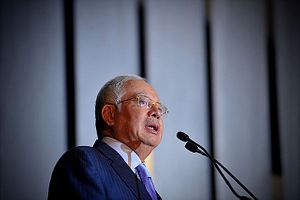Malaysian Prime Minister Najib Razak rebuked Philippine president-elect Rodrigo Duterte’s suggestion that he may reignite the Sabah dispute between the two nations, urging Manila on Monday to instead focus on resolving its own decades-old insurgency in the country’s south.
Duterte, the tough-talking mayor of Davao City who won the Philippine presidential elections this month, made headlines last week when he appeared to recognize the claim of the sultanate of Sulu which had ruled over parts of Sabah before the British had transferred it to the Federation of Malaysia in 1963 (See: “The Philippines Under Duterte: Reassurance Needed at Home and Abroad”).
Though the president-elect is notorious for his offhand comments, his remarks struck a chord in Malaysia, which just in 2013 had seen over 200 descendants of the sultanate attempting to assert the Philippine claim to Sabah, leaving dozens of militants, civilians and Malaysian security forces dead in what is termed the Lahad Datu Incident. After Duterte’s statement, Malaysia’s foreign ministry reiterated the country’s position that it did not recognize any claims by any party on Sabah, while Sabah’s chief minister Musa Aman dismissed the claim as “irrelevant.”
On Monday, during his keynote address to open the Asia-Pacific Roundtable in Kuala Lumpur – one of the region’s premier annual Track Two forums – Najib also took aim at Duterte’s remarks on Sabah, urging the president-elect to instead use his time more productively to help resolve one of Asia’s longest running insurgencies in the southern Philippines.
“That certainly would be more productive than reigniting the Sabah claim issue,” he told conference participants in remarks that lasted around twenty minutes.
Noting Malaysia’s role in precipitating negotiations to resolve that insurgency, Najib said that implementation of a historic peace deal reached between the Philippine government and the Moro Islamic Liberation Front (MILF) in March 2014 would be a welcome boost not only for Manila, but Malaysia-Philippine relations as well.
“Peace is an end itself, and if we can help bring to a close a dispute that has costs so many lives, we would be honored to do so. But stability would also allow the region to prosper, and make the seas between two neighbors safer, that would benefit both Malaysia and the Philippines,” Najib said.
A series of kidnappings over the past month or so by the Philippine militant group Abu Sayyaf involving Indonesians and Malaysians off Sabah had led the three countries to jointly boost efforts to tackle security challenges in the Sulu Sea (See: “Indonesia, Philippines, Malaysia Agree on New Joint Patrols After Kidnapping”).
Malaysia has also taken measures of its own to increase its security in Sabah following the Lahad Datu incident as well as the series of kidnappings, including through the strengthening of the Eastern Sabah Security Command (ESSCOM) (See: “What Does Malaysia’s New Defense Budget for 2016 Mean?”). Over the weekend, Najib had attended a groundbreaking ceremony for a new helicopter forward base at the Lahad Datu airport where he declared that Malaysia would “defend every inch of Sabah’s sovereignty.”

































